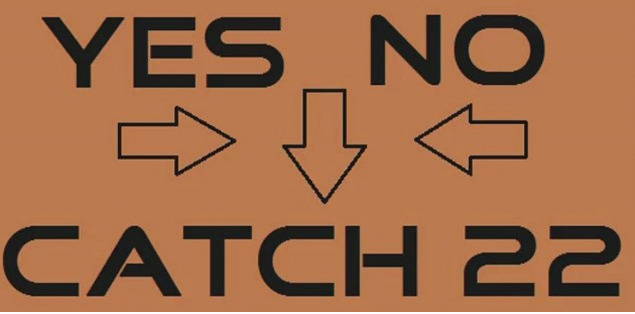Caught between containing a global pandemic and saving a collapsing economy, India is caught in a Catch-22 situation, unable to decide which way to go. Some states are already putting pressure on prime minister Narendra Modi to extend the lockdown so let’s look at the alternatives before the Government and their consequences.
As we know, about the Coronavirus with certainty is the fact that it is highly infectious and spreads rapidly when social distancing is not maintained. A single person may infect half a dozen others and each one of these may infect half a dozen more and so on, till thousands of people are sick. This is like a chain reaction in an atomic bomb. So, if the Government lifts the lockdown, it will be endangering millions of people who will start going about their business as usual, because even if one or two in the crowd is a COVID-19 vector, they will set off the chain-reaction of infection, till it spreads to lakhs of people.
Ending the lockdown may result in a huge surge in Coronavirus cases and many more deaths the effect of the pandemic has been felt more by the developed nations. Nations are fighting over medicines. It is universally accepted that as yet there is no vaccine or cure for the disease (though research is going on at a war footing worldwide). Till now the only way we know how to stop the spread of the virus is through social distancing. The lockdown in India forced people to observe social distancing and this meant that a Corona-positive person could not infect others. This enforced social distancing will end when the shutdown is lifted as people will start meeting each other in schools, factories, offices, business houses, media houses, courts, malls, restaurants, cinema halls, religious places, trains, buses and so on, thereby spreading the disease.
To continue with the shutdown may result in poor people dying of hunger in large numbers as they are deprived of food, work and money, like the immigrant workers in cities who had to trek hundreds of kilometers on foot to their villages. A whopping 80-90 per cent of Indian workers are in the unorganized sector of the economy and these are daily wage earners, having no security of tenure. The shutdown has hit these workers and their families the hardest. Reports are coming in from rural areas that farmers cannot sell their produce as there is no transport available to take it to the wholesale markets, besides the fact that no one is coming to them. Hence their produce is often perishing unsold. Also, this is harvest time but the labourers who used to work fields are not available, as they mostly used to come from towns or nearby districts and states, but are unable to do so because of the lockdown. Hence, farmers will suffer major harvest losses.
The world has survived all pandemics of the past. We are alive and more prosperous than ever is proof to that. Humans have vanquished past pandemics with much lower degree of medical advancements.
Although Narendra Modi has said the only remedy of this virus is social distancing and changes our habits. The coronavirus lockdown may be lifted after one extension nationwide. But it is likely to happen not in one-go lest a sea of humanity hits the road at once.
Further relaxations can happen depending on the progress of coronavirus containment. But relaxation can only be offered if new cases stop in the area.
Everybody is being advised to wear mask while going out. Delhi’s Arvind Kejriwal government has already made it mandatory for everybody leaving home. The government has said anybody found without mask in public places would be prosecuted. Some of the health experts elsewhere in the world have suggested that masks should now become an essential part of human’s dress code.
Social distancing that is being practiced by a large number of people at public places should not go out of habit. Novel coronavirus is now a human virus. It is here to stay, possibly for decades if not forever, much like HIV, dengue and influenza viruses. There is a danger that it may keep coming back periodically.
Keep practicing social distancing when lockdown is lifted is going to be a challenge particularly during traveling by public transport. There may be a rush for buying personal vehicles – scooters, bikes and cars – which would be good for struggling auto sector but may raise air pollution levels by several notches. If this happens, it would lead to a different set of complications.
Lockdowns may be repeated every time if there is an outbreak of coronavirus. Stress and other psychological problems would come as byproducts which everybody would need to deal with at personal level or seek professional help.
The government must strengthen public healthcare infrastructure, particularly in smaller towns and villages. According to ministry of health figures, India has around 25,780 government hospitals. The number of all-equipped laboratories should be increased and their penetration should be wide enough to include all 716 districts.
Basic hygiene rules learnt during the times of coronavirus outbreak and lockdown must not be forgotten and thrown out of practice. It would be wise for everybody to carry something like a first-aid box all the time that contains a soap bar, a pair of face masks, a pair of hand gloves, a despicable of sanitizer, and a note to remind about social distancing. That will be a post-corona virus civilization.

Sanjay Dutta, an engineer by qualification but is a journalist by choice.
He has worked for the premier new agency Press Trust of India and leading English daily Indian Express.
With more than a decade of experience, he has been highlighting issues related to environment, tourism and other aspects affecting mountain ecology.
Sanjay Dutta lives in a village close to Manali in Kullu valley of Himachal.




